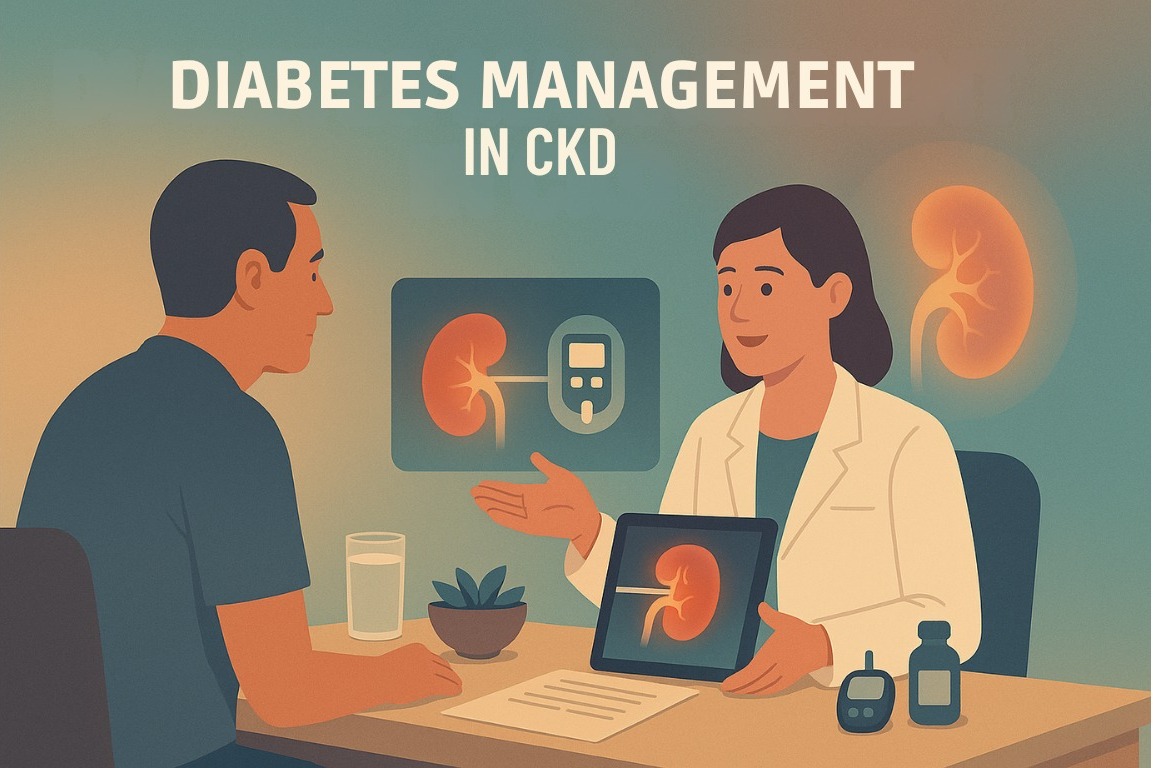If you’re living with diabetes, you may be worried about your kidney health. But keeping a close eye on your blood sugar levels and taking steps accordingly can reduce your risk of chronic kidney disease by nearly 50%.
It is even more important because 1 in 11 adults is facing diabetes, and 40% at risk of developing CKD, and most people find it difficult to manage diabetes in CKD.
But you don’t need to feel hopeless because there are always. We will walk you through proven and practical strategies that will help you make informed food choices, adopt healthy lifestyle changes, and select the right treatment or medication.
All these strategies are designed to protect your kidneys and slow CKD progression. Through effective diabetes management in CKD, we will also help you understand why blood sugar balance matters so much, learn about management techniques, and see how MedicoExperts’ Combination Therapy can help create a personalized plan tailored to your unique needs.
Why Blood Sugar Control Matters for Kidney Health?
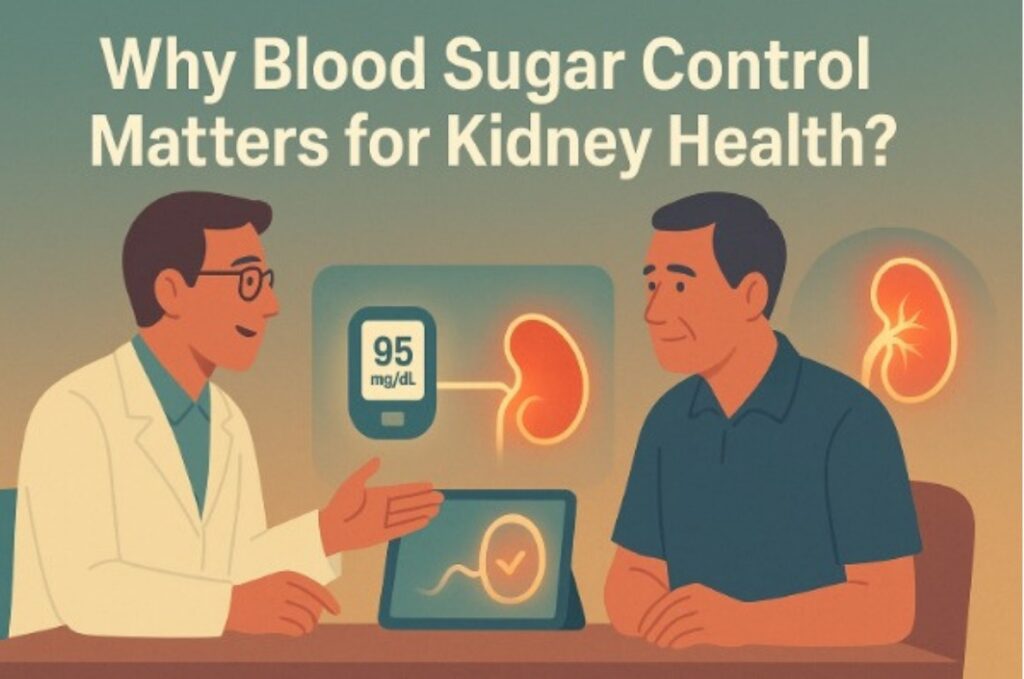
Controlling your blood sugar is extremely important for your kidney health because the kidneys are your body’s filters that remove waste and extra fluid from your blood.
But when your blood sugar levels stay high for a period of time, that excess sugar starts to damage the tiny blood vessels inside your kidneys. The damage makes it harder for your kidneys to complete their job properly. This leads to a buildup of toxins in your body.
Uncontrolled diabetes is actually the leading cause of chronic kidney disease (CKD). But keeping your blood sugar levels under control can significantly slow down this damage.
Controlling diabetes can even prevent CKD from developing in many cases. Managing your blood sugar not only protects your kidneys from damage but also keeps your heart, eyes, and nerves healthy.
How does Diabetes Cause Damage to the Kidneys?
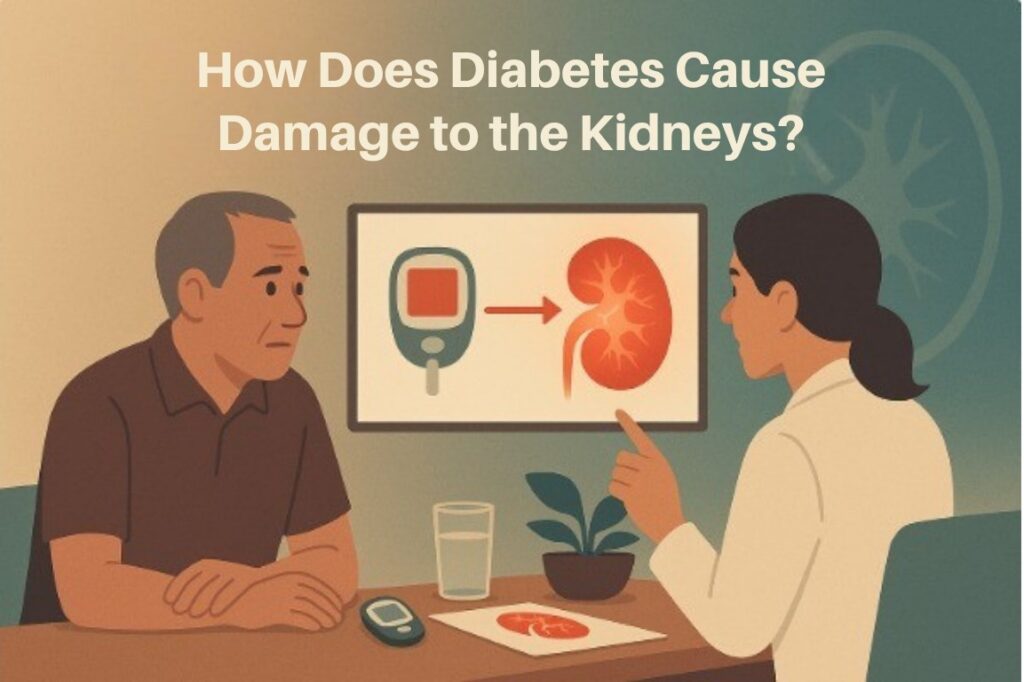
Diabetes gradually damages your kidneys in different ways. It is considered a major nephropathy (any disease or issue that harms your kidneys). It mainly affects the kidneys, blood vessels, nerves, and urinary system. Your kidneys have tiny blood vessels that work as filters to remove waste from your blood.
When your blood sugar levels remain high for an extended period, these vessels can become narrowed and clogged. Because of this, the blood flow is obstructed, and the filter weakens and leaks. Also, important proteins like albumin start to pass into the urine, which is an early sign of kidney damage.
High blood sugar can also damage the nerves that control your bladder. When these nerves don’t work properly, you may not feel when your bladder is full. This extra pressure can push back on your kidneys and damage them.
Diabetes also increases the chances of urinary tract infections (UTIs). Bacteria thrive in urine that has too much sugar, and this infection can spread from the bladder to the kidneys if not treated immediately.
All these are the reasons you need to manage diabetes if you have CKD.
What are the Blood Sugar Targets for People with CKD?
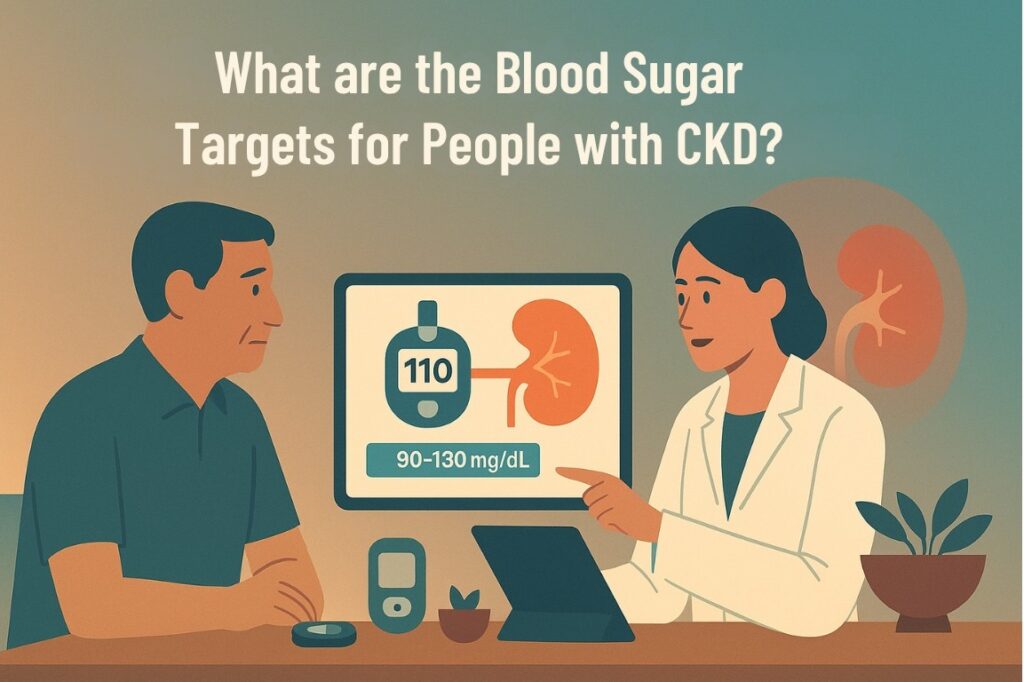
If you have diabetes and CKD, glycemic control (blood glucose levels) in CKD and keeping the blood sugar level within the right range is essential for your kidney health. The exact target will vary as per your age, overall health, and other medical conditions. But these are the targets experts have recommended:
- Before meals (fasting): 80–130 mg/dL
- Two hours after a meal: Below 180 mg/dL
- A1C (three-month average blood sugar): Around 7% or as advised by your doctor
It’s important to remember that these numbers will not be the same for everyone. People with advanced CKD, older adults, or those with other health issues may have slightly higher targets to avoid low blood sugar (hypoglycemia).
You need to talk to your doctor about what levels are the safest for you and, accordingly, take steps to maintain that level.
Lifestyle Strategies for Diabetes Management in CKD
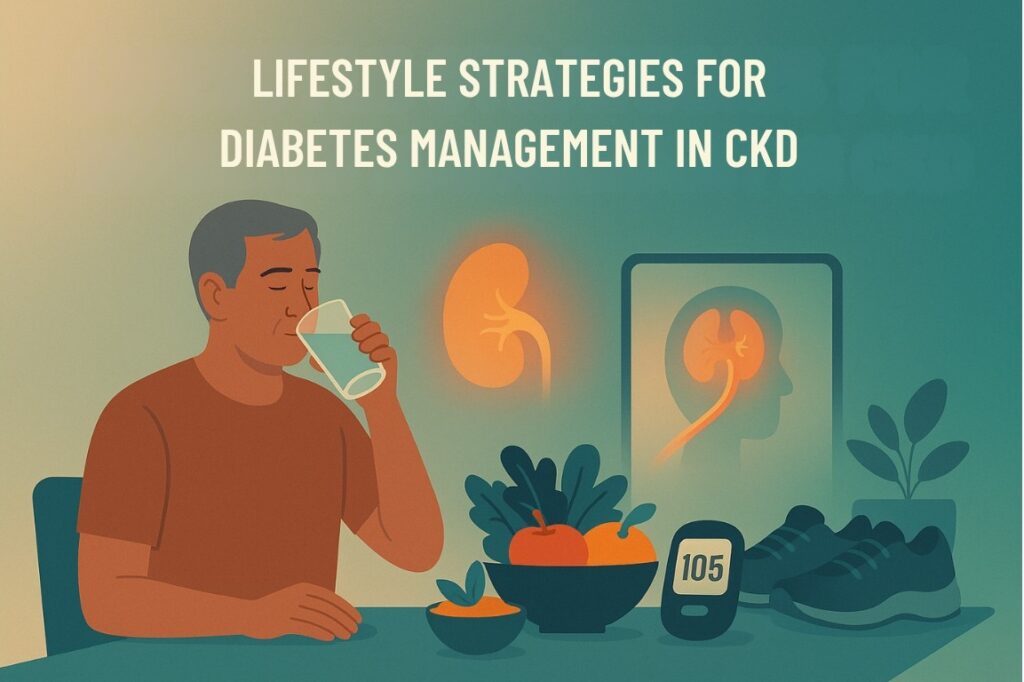
Only depending on medicines to maintain blood sugar will not be an effective strategy to manage blood sugar. Your daily habits and lifestyle are the controlling factors of your sugar levels, and to protect your kidneys from diabetes. So, you need to have small, consistent changes in your lifestyle.
- Have a balanced diet: Your diet should consist of fresh fruits, vegetables, whole grains, lean proteins, and healthy fats. But you need to avoid refined carbs like bread, pasta, and white rice; sugary drinks; and processed food. Also, if you have CKD, keep a tab on your salt and protein intake and follow your doctor’s advice.
- Stay active: You need regular exercise because it helps your body use insulin better and keeps blood sugar levels steady. Even if you do a 30-minute walk, yoga, or light workout most days of the week, it can help a lot.
- Stay hydrated: Drinking enough water supports kidney function and helps flush out toxins. But if your doctor has limited your water intake due to CKD, follow their advice carefully.
- Take medication as prescribed: Stick to your prescribed medication. Avoid skipping doses, as it may quickly affect both your blood sugar control and kidney health.
- Monitor regularly: Keep track of your blood sugar and blood pressure levels. Regular checkups help spot changes early and prevent kidney damage.
- Manage stress and sleep well: Your stress level and sleep are directly related to your blood sugar levels. You can try relaxation techniques like meditation and deep breathing. Make sure you get enough sleep.
The Role of Blood Pressure in CKD
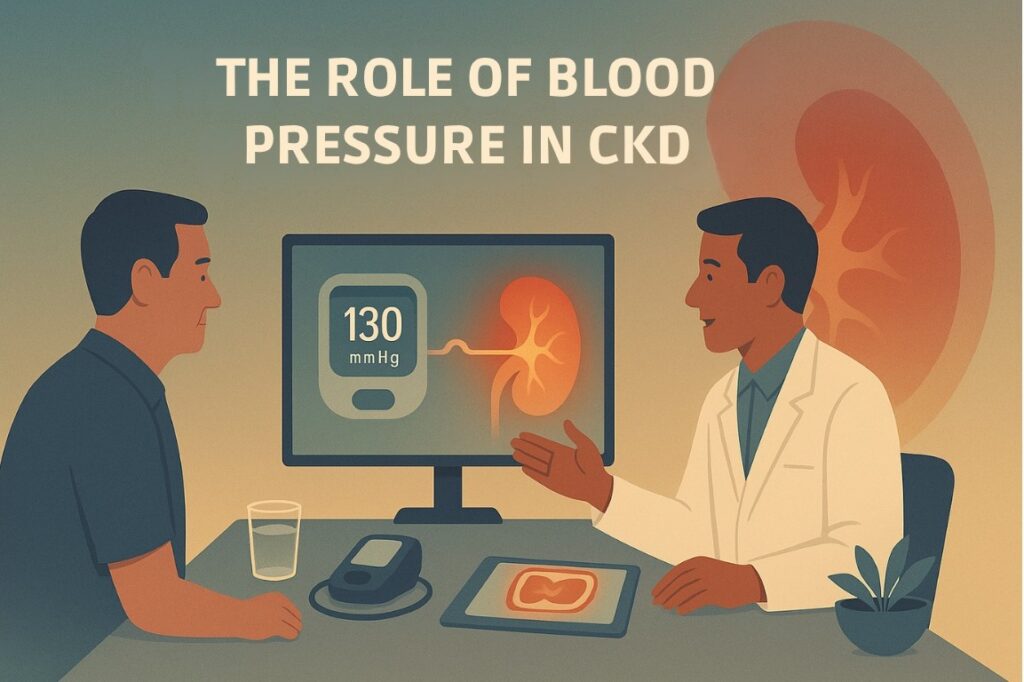
High blood pressure is not only the cause; it is also the consequence of CKD. When blood pressure is high, it can damage the delicate blood vessels in the kidneys. This makes it harder for them to filter the waste from your blood.
This can lead to CKD progression over time. On the other hand, when you have damaged kidneys, they can struggle to regulate blood pressure, which can lead to even higher readings. That’s why you need to manage blood pressure through lifestyle choices and medicines. Monitoring your blood pressure regularly is extremely important.
Medications and Therapies to Support Kidney Health
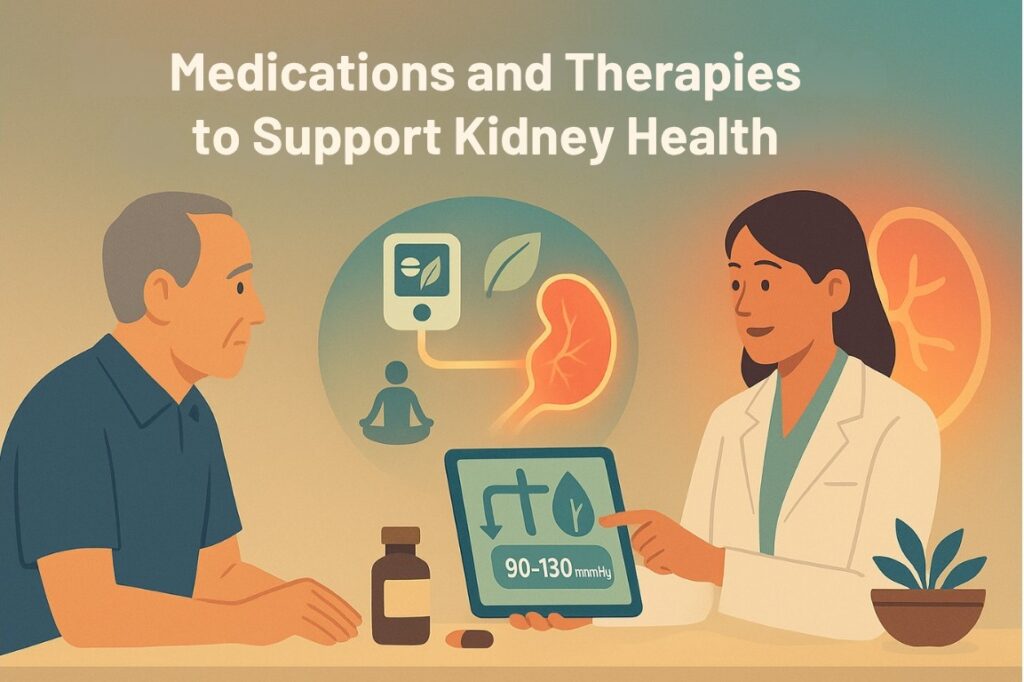
You will need medications and therapies aimed at protecting kidney function and managing related conditions to maintain kidney health. Here are some common treatment options doctors use to support your kidney health:
- Blood Pressure Medications: These medicines help control high blood pressure, which protects the kidneys from further damage.
- Diabetes Medications: For people with diabetes, controlling blood sugar prevents additional kidney strain. So, the doctor may prescribe medicines for that.
- Diuretics: These medicines reduce fluid buildup and swelling caused by CKD.
- Cholesterol-Lowering Medicines: Doctors will prescribe medication for cholesterol to help reduce the risk of heart disease, which is common in CKD patients.
- Medications for Anemia and Bone Health: These medicines address complications that can arise from impaired kidney function.
- Dialysis: In advanced CKD, dialysis removes waste and excess fluids from the blood.
- Kidney Transplant: Kidney transplant is considered when the kidneys fail and other treatments aren’t sufficient.
How MedicoExperts’ Combination Therapy Enhances Blood Sugar and Kidney Health?
CKD has many related issues and is a complex disease, and that’s why one treatment option cannot tackle all these issues. CKD affects your kidneys, blood pressure levels, and energy level, and using a combination of treatments can handle all of these issues safely and effectively.
Combination therapy is one way to get better and safer results. In this therapy, allopathy, Ayurveda, and homeopathy are brought together by a team of specialists from all these fields of medicine. When this therapy is planned and monitored well, it can help slow disease progression and ease symptoms.
Allopathic Medicine
Ayurveda
Homeopathy
Regenerative and Supportive Therapies
Diabetes Management in CKD – Takeaway
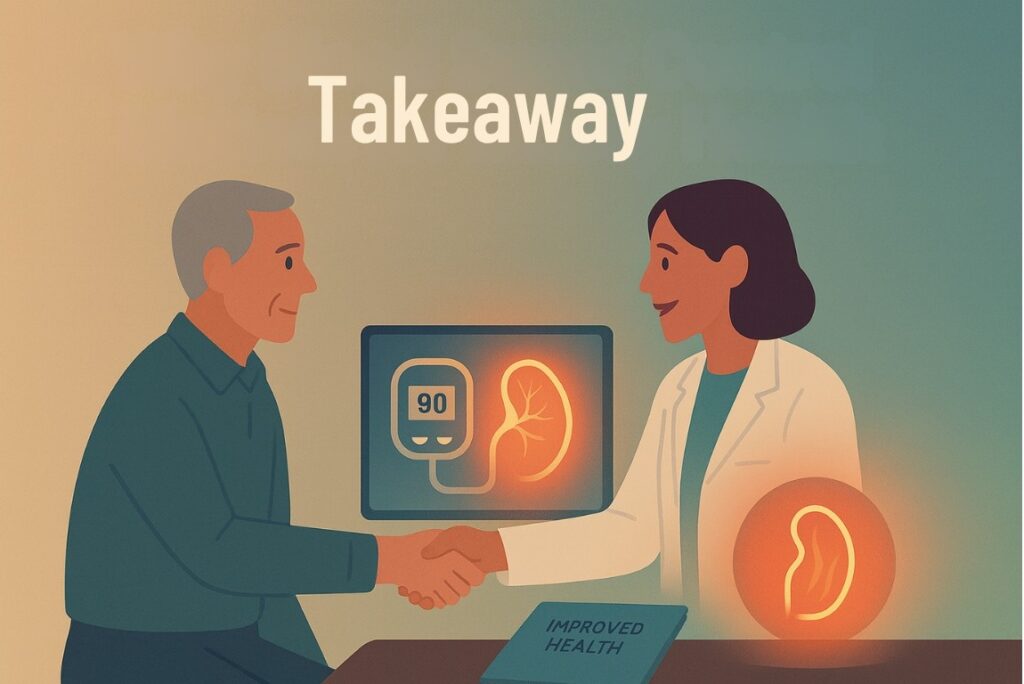
If you have CKD, you need management to protect kidney function and slow down the disease progression. Medications and therapies play a crucial role in managing diabetes and blood pressure.
Combined therapy and better lifestyle choices are the best way to manage diabetes in CKD. They also slow down the progression, which gives you a better and more comfortable life.
Protect your kidneys and take control of your health today. Consult a MedicoExperts specialist to create a personalized CKD management plan and keep your kidneys healthy.
Frequently Asked Questions (FAQs):
Q1. Can CKD affect how diabetes medications work?
A. Yes, kidney function impacts how the body processes medications, so doses may need adjustment to avoid side effects.
Q2. Are lifestyle changes effective for blood sugar control in CKD?
A. Yes, experts also believe that lifestyle changes are effective for blood sugar control in CKD. Balanced diet, portion control, regular exercise, and weight management help maintain stable blood sugar alongside medications.
Q3. How often should a CKD patient with diabetes monitor their blood sugar?
A. Regular monitoring is crucial; daily home checks and periodic lab tests (like HbA1c) help track blood sugar and adjust treatment safely.
Q4. Can uncontrolled diabetes speed up CKD progression?
A. Yes. High blood sugar damages kidney filtering units (nephrons) over time, speeding up CKD progression. Keeping blood sugar within target ranges helps protect kidney function and slow disease progression.
Q5. Can blood sugar levels affect CKD symptoms like swelling or fatigue?
A. Yes. Uncontrolled blood sugar can worsen fluid retention and fatigue, making CKD symptoms more severe. Proper diabetes management helps reduce swelling, improve energy, and support overall kidney health.
Q6. Can combination therapy help manage both CKD and diabetes effectively?
A. Yes. Combination therapy brings together medications, diet, and lifestyle changes personalized to your condition. It helps control blood sugar, support kidney function, reduce symptoms like fatigue and swelling, and slow CKD progression. But to achieve safe and effective results, you need a team of specialists from all the fields of medical sciences.
References
Relevant Articles For You
What Is Chronic Kidney Disease?
In chronic kidney disease (CKD), your kidneys lose their function gradually. If the CKD reaches advanced…..Read More
Why CKD Is Getting Worse?
If you are in stage 3 or 4 of CKD, you might be wondering why your kidneys are seemingly weakening despite…..Read More
Manage CKD Swelling Naturally
You may be feeling uncomfortable and frustrated due to swelling related to chronic kidney disease. But you will feel relieved after…..Read More
Permanent Cure For Diabetes
Diabetes is a chronic health condition in which your blood sugar levels go up. It occurs when the body either cannot produce enough…..Read More
Foods To Reduce Blood Sugar Levels
For people with diabetes, it is good to take food that is absorbed slowly by the body. This will prevent any kind of…..Read More
Recommendations To Understand Different Treatments
Stem Cell Therapy For Diabetes
Stem cell treatment is considered one of the most effective forms of therapy currently available for diabetes. While offering…..Read More
Pancreas Transplant
Type 1 diabetes affects every person differently. That’s why we move beyond standard treatments. Our approach combines…..Read More
Medically Reviewed by MedicoExperts Editorial & Clinical Review Board on 9 October 2025
Medical Disclaimer: This content is for informational purposes only and is not intended as medical advice, diagnosis, or treatment. Always seek the advice of your physician or other qualified healthcare provider regarding any medical condition or dietary needs.


